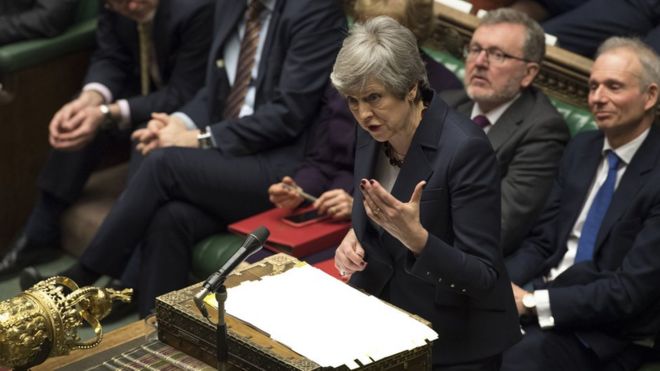 UK PARLIAMENT/MARK DUFFY
UK PARLIAMENT/MARK DUFFY
The Brexit process remains in deadlock as MPs struggle to find a consensus on the next steps.
The Commons failed to find a majority for a way forward after voting for eight different options on Wednesday.
And while some senior Brexiteers have moved towards supporting Theresa May's deal, the MPs she relies on in the DUP have refused to alter their stance.
Commons Leader Andrea Leadsom told MPs there would be a further debate on a government Brexit motion on Friday.
But it is unclear yet whether this will end with a third "meaningful vote" on the PM's deal.
On Wednesday, Speaker John Bercow reiterated that he would not allow a third "meaningful vote" on "substantially the same" motion as MPs had already rejected by historic margins twice.
But Mrs Leadsom told the Commons: "The motion tabled will comply with the Speaker's ruling."
She added: "The only way we ensure we leave in good time on 22 May is by approving the withdrawal agreement by 23:00 GMT on 29 March."
- Reaction as MPs reject all Brexit options
- No majority for any of Brexit options
- How did my MP vote on Brexit options?
Mrs May won some support for her plan by saying she would resign ahead of the next round of EU negotiations if her deal passes.
Her close ally and former deputy Damian Green told BBC Radio 4's Today programme that the prime minister will "take the path of soldiering on".
But although the prime minister has won over the likes of former foreign secretary Boris Johnson, a number of hardcore Brexiteers are still refusing to vote for the deal.
Former Brexit secretary Dominic Raab said he still believed it is still possible to get concessions from the EU on the deal, but if the bloc does not move, there should be "sensible conversations" around no-deal.
And the vice-chairman of the backbench European Research Group, Steve Baker, has suggested he may resign the Conservative whip rather than vote for the deal.
What happened last night?
MPs voted to seize power of the Commons on Wednesday and put forward a series of options to take Brexit forward - including leaving without a deal, creating a customs union and backing a confirmatory referendum on any deal.
But after several hours of debate, none of the eight options emerged as a front runner among MPs.
Conservative MP Sir Oliver Letwin, who oversaw the unprecedented process of "indicative votes", said the lack of a majority for any proposition was "disappointing".
But he told the Today programme no "assumptions" should be made about the outcome of further indicative votes, which he believes should take place on Monday if the PM's deal is not approved this week.
"It's very difficult to translate from how people vote the first time, when they don't know how other people are voting, to how they will vote when they can see how other people are voting under new circumstances," he said.

Ahead of Wednesday's debate, Mrs May told a meeting of Conservative backbenchers she would leave office earlier than planned if she won Parliament's backing for her withdrawal agreement with the EU.
Mrs May told her MPs: "I have heard very clearly the mood of the parliamentary party. I know there is a desire for a new approach - and new leadership - in the second phase of the Brexit negotiations - and I won't stand in the way of that."
She told MPs she would resign as party leader after 22 May - the new Brexit date - but stay on as PM until a new leader is elected. However, Downing Street said it would be a "different ball game" if the deal was not passed.
Has Mrs May's promise to quit worked?
Mrs May's announcement that she would not lead the talks with Brussels over the future relationship between the UK an EU prompted a number of Tory opponents of her deal to signal their backing.
The BBC's political editor Laura Kuenssberg says the controversy over the PM's deal has been centred on the withdrawal agreement - or the first phase of Brexit - so for many Tory MPs, a reassurance that it won't be Mrs May who leads that next phase is important.
But, she says, politics is a strange business, and rivalries and ambition may be part of many MPs' calculations too.
Prominent Leave supporters such as Mr Johnson and former Tory leader Iain Duncan Smith said they now viewed prime minister's deal as the least-worst option.
But Mrs May needs to win over 75 rebels to overturn the 149-vote rejection of her deal on 13 March.
And many, including prominent Brexiteer and leader of the European Research Group, Jacob Rees-Mogg, will not side with her unless she gets the support of the DUP - whose leader said on Wednesday they could not vote for the deal.
Mr Rees-Mogg told reporters: "I don't think the deal's suddenly got better, simply that the alternative is now worse.
"I'm in favour of the deal and I hope the DUP will come over to the deal, but we'll have to wait and see what they do."
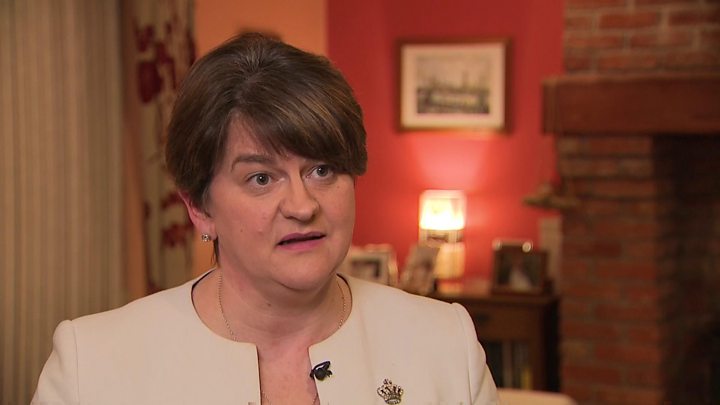
The DUP's main objection is to the backstop, the "insurance policy" designed to avoid the return of border checkpoints between Northern Ireland and the Republic of Ireland in the event a future trade deal is not agreed.
It argues that the measure would result in Northern Ireland having to abide by different trade rules to the rest of the UK, which leader Arlene Foster says would "damage the Union".
"The backstop in that withdrawal agreement makes it impossible for us to sign up to the agreement," she told the BBC.
Party colleague Jim Wells said no unionist would ever back Mrs May's withdrawal agreement as it was, since it would leave Northern Ireland "sitting in the waiting room for constitutional change".
Mr Raab said he wanted the government to go back to the EU again, to "keep the arm of friendship open" and "explain that there's still time for an exchange of letters providing a legally binding exit from the backstop".
He added: "A lot of people say the EU just won't move. That's been treated as a fixture of these negotiations rather than being tested."
But, if not, Mr Raab called for conversations to "mitigate any potential damage" from leaving without a deal.
"If we do all of those things in the spirit of realism and pragmatism, we'll find a way through," he said.

No clear message from MPs

Parliament demanded to be heard very loudly and then, when it spoke, it said lots of different things.
There were signs, both around the idea of a customs union - a closer trading relationship with the European Union than is in the prime minister's deal - and also the idea of having a rubber-stamping referendum.
But there certainly wasn't a clear message.
It is still the view - as ministers have said to me in recent weeks - that ultimately, even if Parliament takes control of some of this process, in the end they will go down a list, they will tick off the options one by one and all routes will lead to a form of Theresa May's deal .
But the political damage that has been done and the political authority she has now staked and then lost over her offer to resign, make that harder and harder by the hour.
It may well be by Monday, and some people in cabinet now predict this, we are either looking at the prime minister going to Brussels to say we need a long extension or the country - as Oliver Letwin suggested - is seriously heading towards leaving without a deal.

There are also signs Theresa May's offer to resign has hardened Labour opposition as they fear what the next Tory leader will push for.
Labour MP Liz Kendall told the BBC's Victoria Derbyshire programme: "I am extremely worried about our future relationship with the EU, and whatever is agreed in Parliament on the withdrawal agreement, the next Tory leader - if they're a hardline Brexiteer - will push for a hard Brexit. I for one am not prepared to let that happen."
Labour's own alternative plan for Brexit - including "close alignment" with the single market and protections for workers' rights - was defeated by 307 votes to 237 on Wednesday.
What happens next?
If Mrs May's deal is not approved this week, MPs are likely to resume discussions about some of the options rejected through the indicative voting process.
Her deal has been rejected twice by MPs: in January by 230 votes - the largest defeat for a sitting government in history - and in March by 149 votes.
Of the alternative Brexit options voted on by MPs on Wednesday, Margaret Beckett's proposal for a confirmatory referendum was defeated by 27 votes and Ken Clarke's proposal for a customs union lost by eight votes.
How MPs voted
| For | Against | Defeated by | |
| Confirmatory referendum | 268 | 295 | 27 |
| Customs union | 264 | 272 | 8 |
| Labour's Brexit plan | 237 | 307 | 70 |
| Common Market 2.0 | 188 | 283 | 95 |
| Revoking Article 50 to avoid no deal | 184 | 293 | 109 |
| No-deal exit on 12 April | 160 | 400 | 240 |
| Malthouse Plan B | 139 | 422 | 283 |
| EFTA and EEA membership | 65 | 377 | 312 |
Former Labour MP Frank Field - who now sits as an independent and has voted for Mrs May's deal - suggested a compromise could be to combine the withdrawal agreement with a customs union after the latter gained the most support of any of Wednesday's proposals.
He told Victoria Derbyshire: "There is the will of the people that said we wish to leave [but] I think the negotiated deal by itself is not going to get through Parliament.
"We therefore need to add to that to get a majority in Parliament. The nearest we got to a majority yesterday was the customs union [so] I think we should combine the two of them."
Commons Speaker John Bercow said on Wednesday the process agreed by the House allowed for a second stage of debate on Monday and there was no reason this should not continue.
While it was up to MPs, he said there was an understanding Wednesday's objective was to "shortlist" a number of options before moving on to consider the "most popular".
UK Politics
Will the DUP hold out on Brexit deal?
- 28 March 2019
- Northern Ireland
No majority for any of Brexit options
- 28 March 2019
- UK Politics

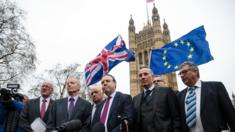


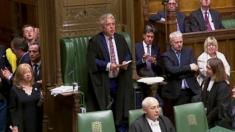


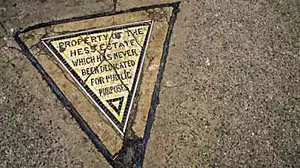
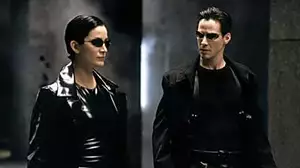


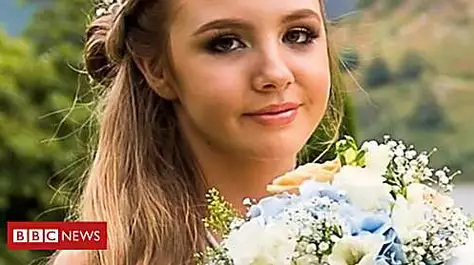
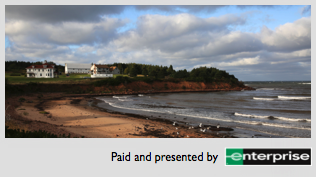
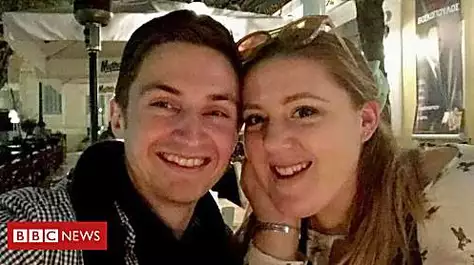

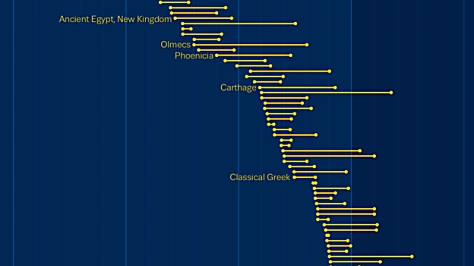
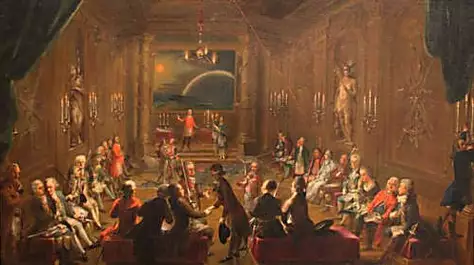

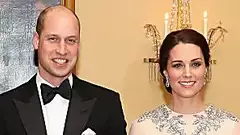
![[Pics] They Uncovered The Ice And Revealed An Incredible Discovery [Pics] They Uncovered The Ice And Revealed An Incredible Discovery](https://images.outbrainimg.com/transform/v3/eyJpdSI6ImM3MGFlNTI2M2RlNGJjYzZlYmM2MDU4NTA5ZjM4M2MzOWYzMWM0NDRlM2Q3MDgzYmM2ZDU0ZWJhNTZkYjFhMTEiLCJ3IjoxNjAsImgiOjkwLCJkIjoxLjUsImNzIjowLCJmIjo0fQ.webp)

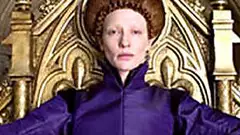

No comments:
Post a Comment